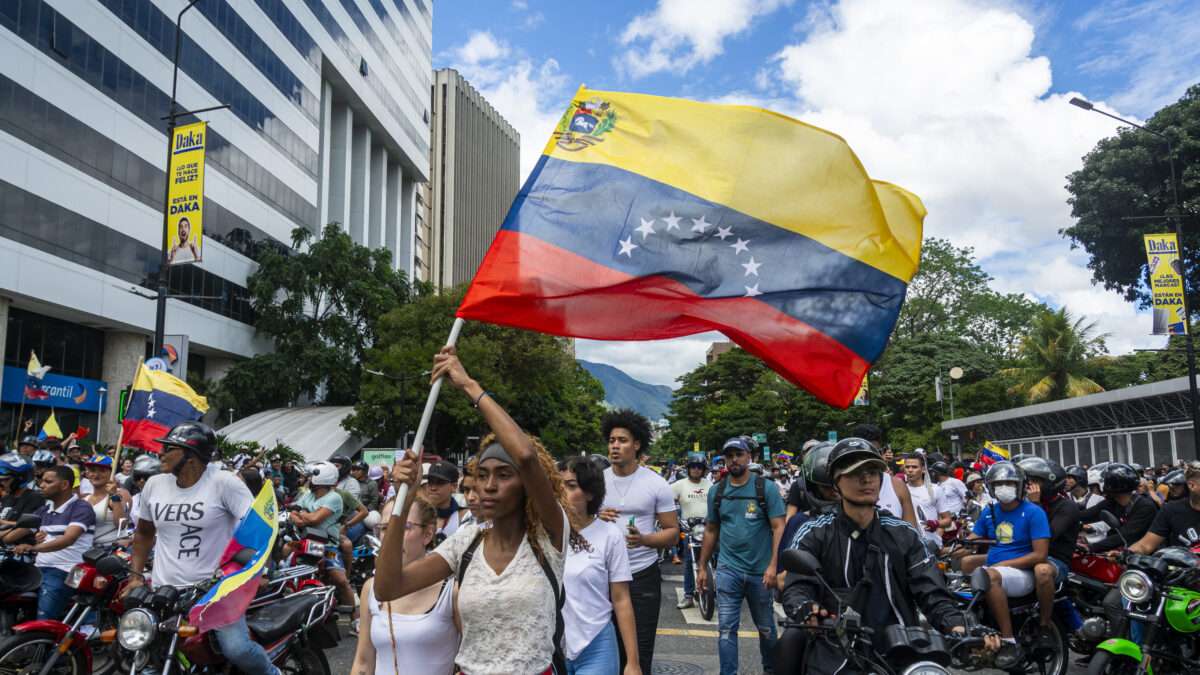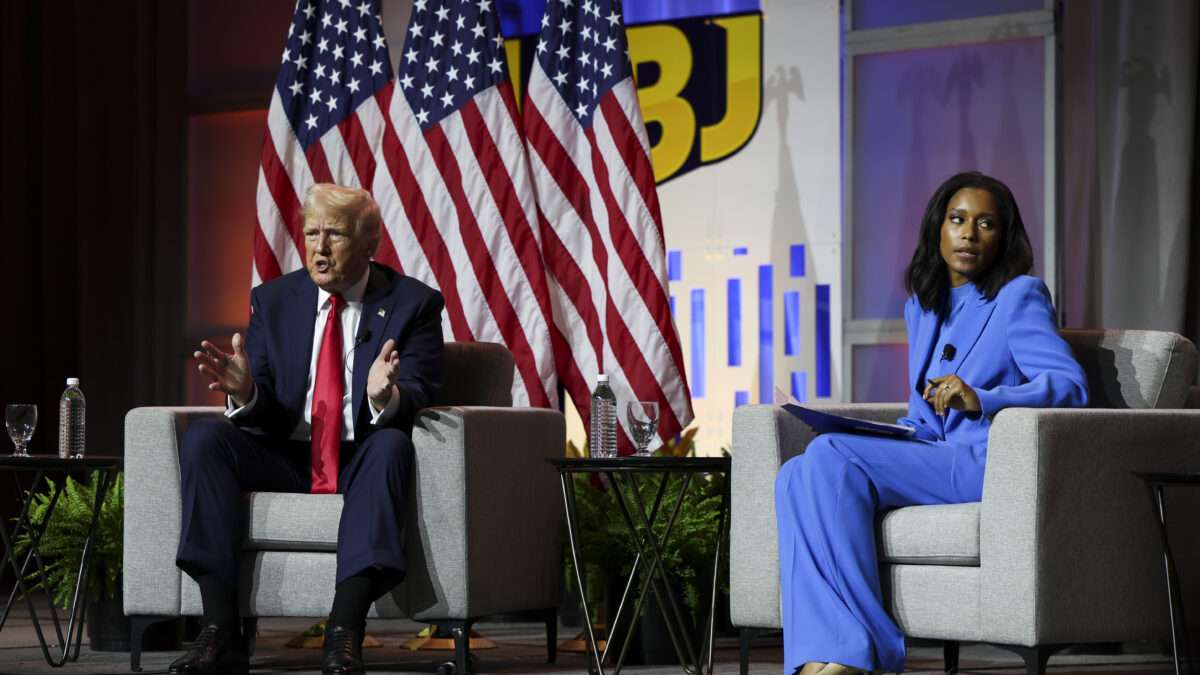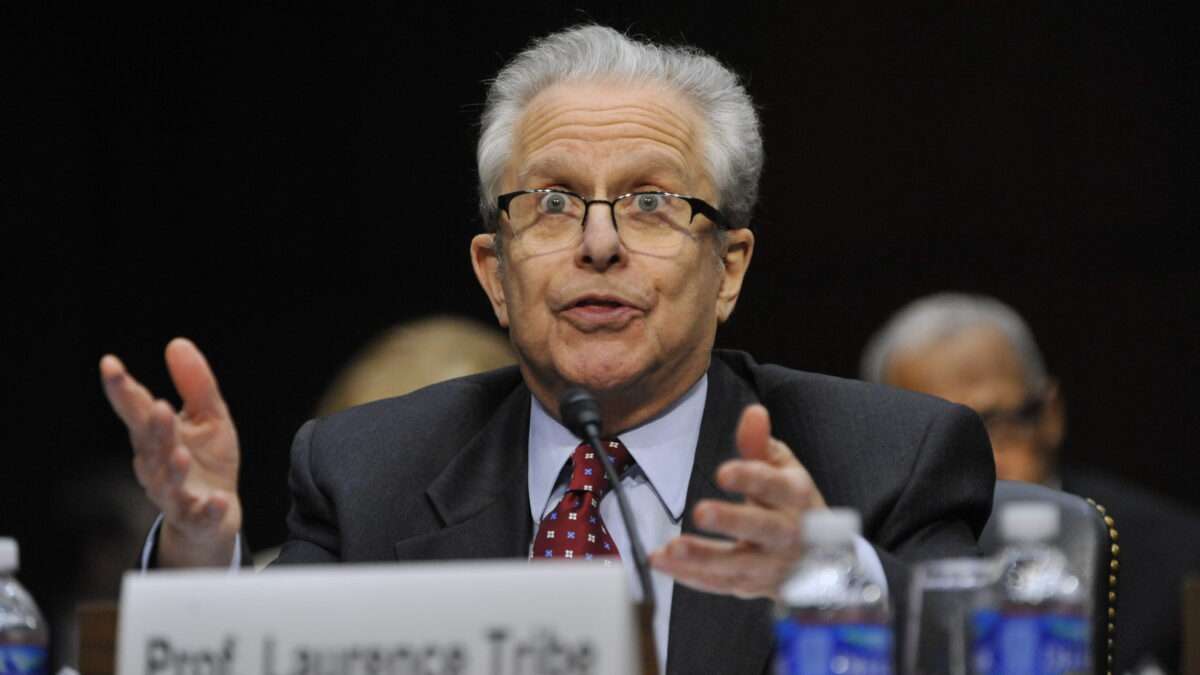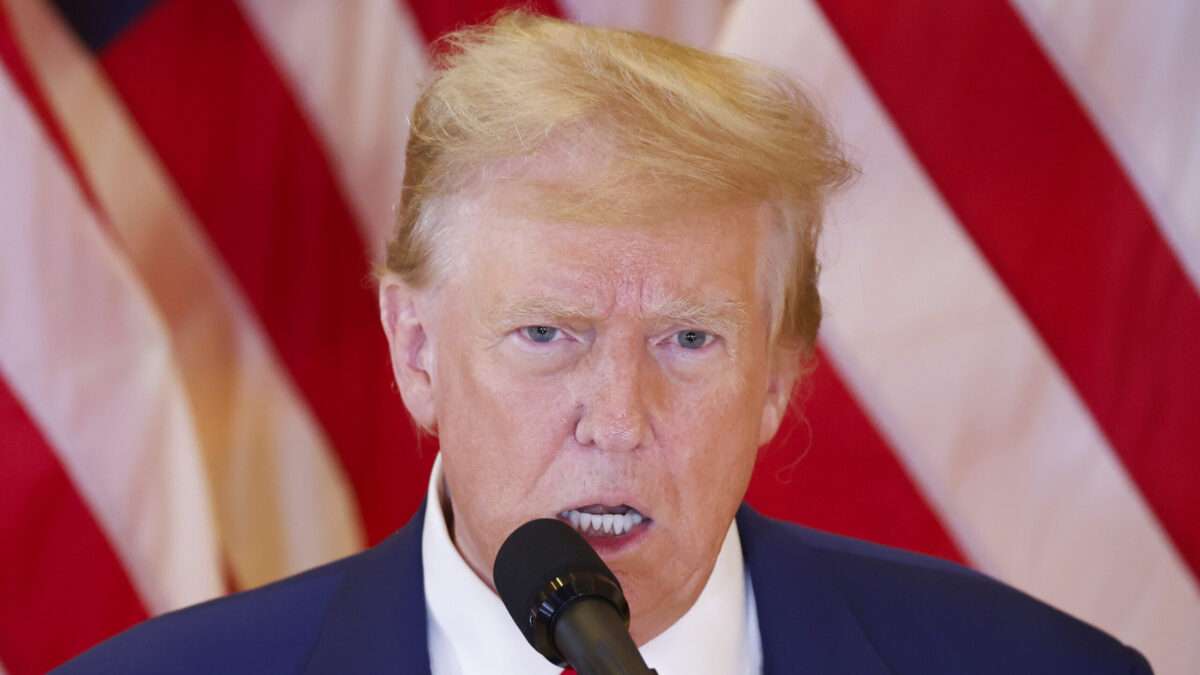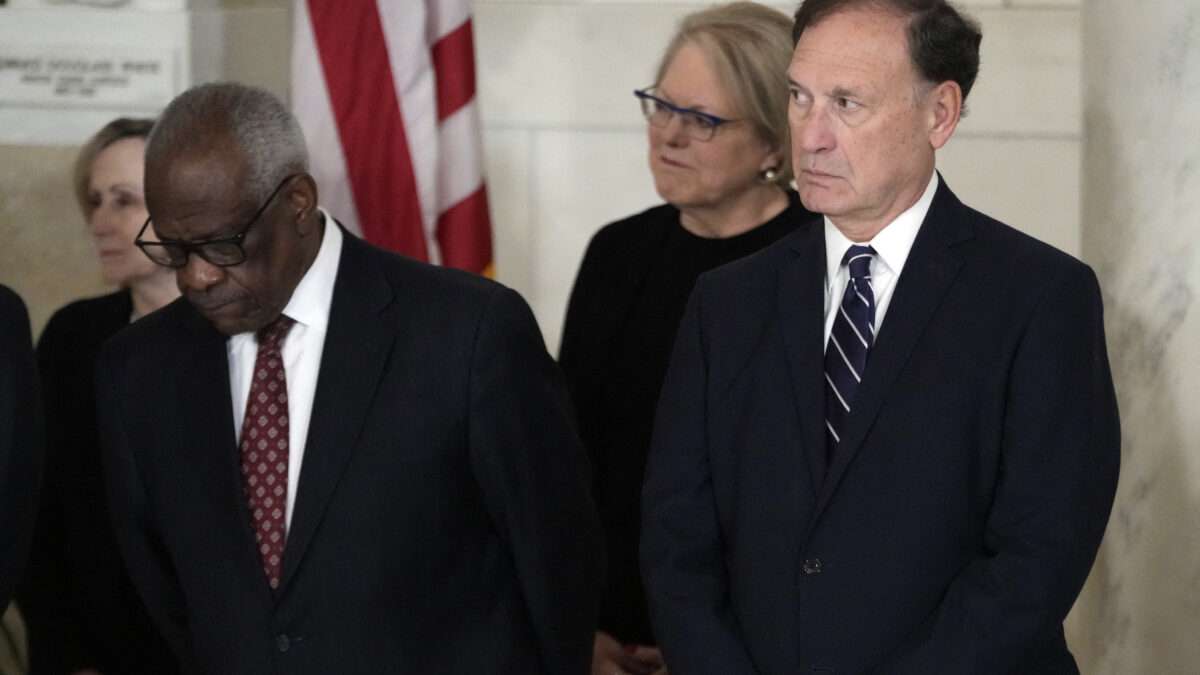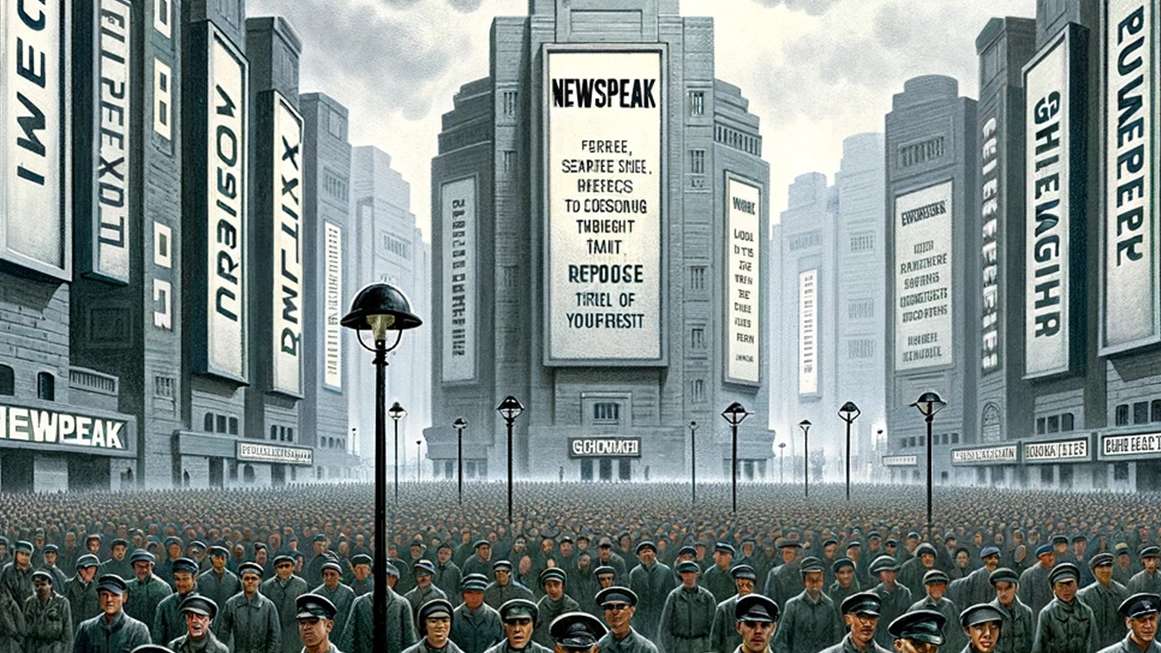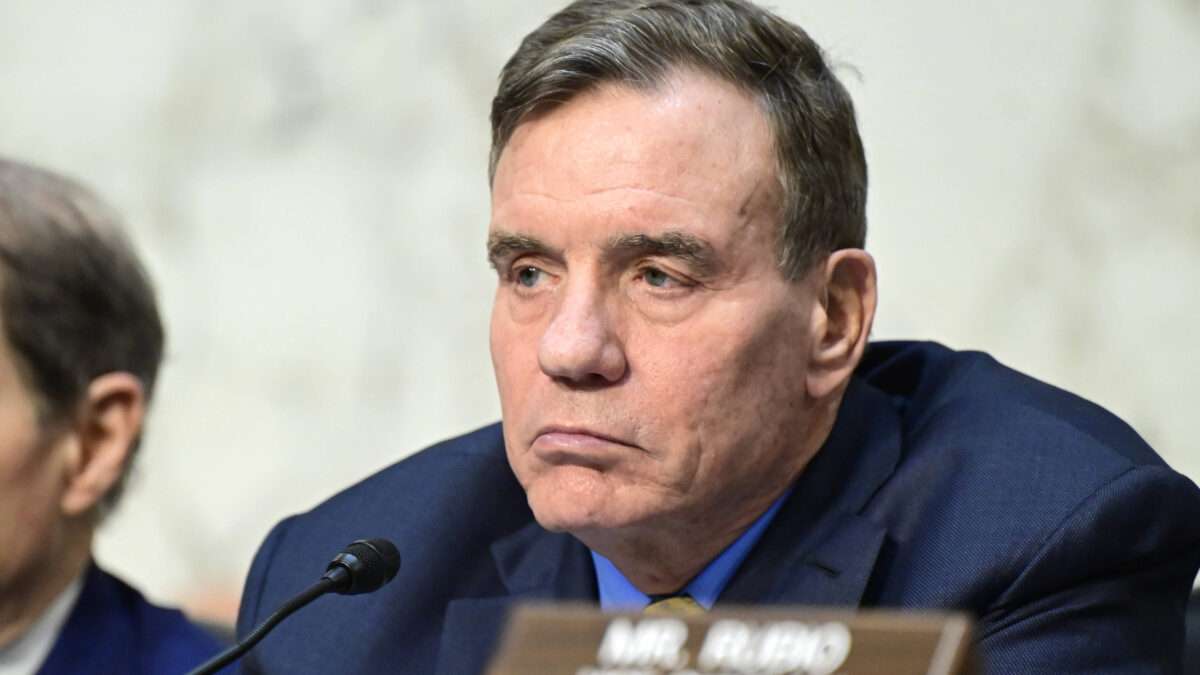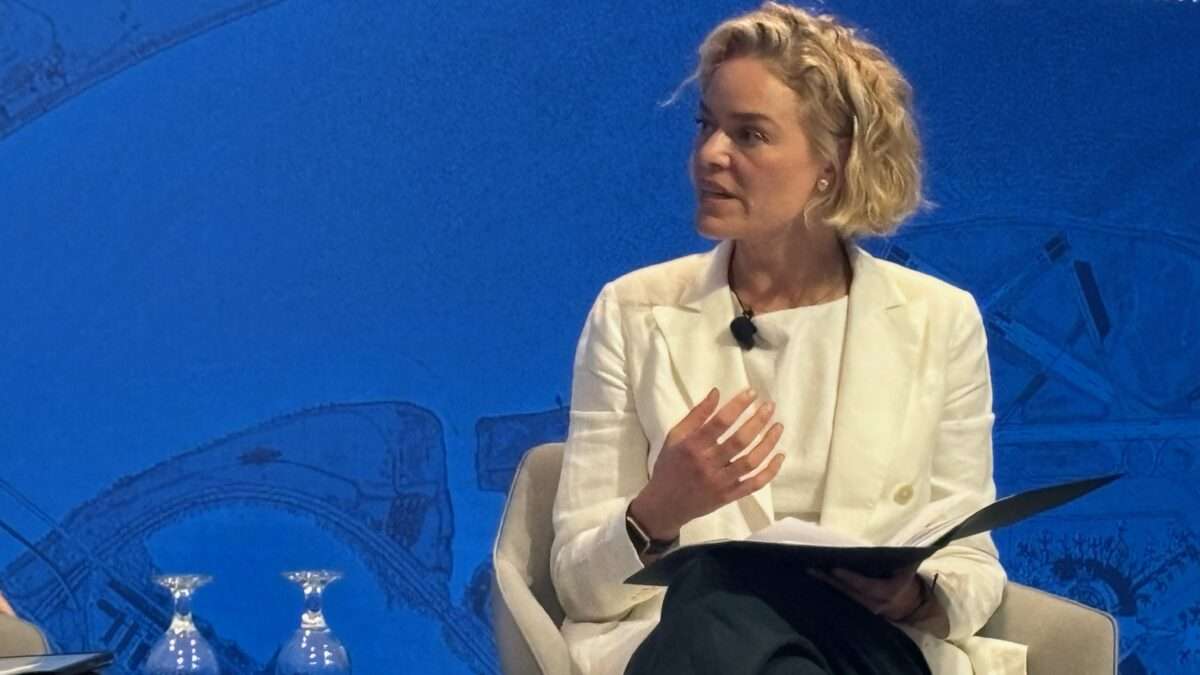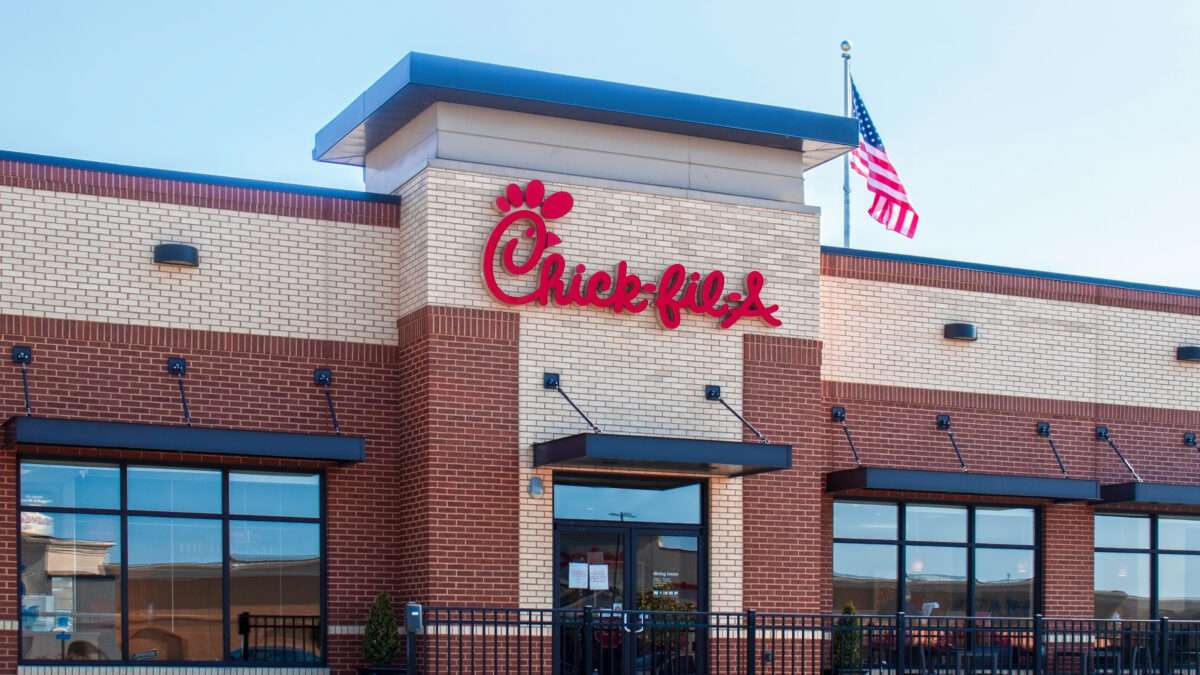Today's guest is maverick journalist Glenn Greenwald, whose work publicizing Edward Snowden's revelations of ubiquitous and illegal surveillance of Americans helped The Guardian win a Pulitzer Prize. Greenwald now hosts the nightly news show System Update on Rumble and maintains an active presence on X (formerly Twitter). Reason's Nick Gillespie and Greenwald talked about the failing fortunes of The Intercept, the investigative website he co-founded in 2014 and had an acrimonious break with in 2020, the Israel/Gaza War, student protests on campuses, legacy media's obsession with disinformation ad Russian interference in the 2016 election, and whether a victory by President Joe Biden or Donald Trump would be worse for America—and the world. This interview was conducted before a live audience in New York City, a day after Greenwald debated Alan Dershowitz at the Soho Forum about whether the United States should attack Iran's nuclear program.
0:00— Introduction
1:10— The Intercept: the trajectory from Snowden reporting to crying emojis
7:09— Trump v Clinton and Biden
11:57— Julian Assange and Wikileaks
21:10— Rumble and decentralized media26:25— Greenwald's journalistic origin story
29:26— College students protests
37:28— Greenwald's Jewish heritage
39:53— What's going on in Gaza?
45:58— Greenwald's foreign policy positions
51:50— Latin American: Milei, Lula, an Bukele
58:50— Drug policy
1:03:18— 2024 Biden vs. Trump election
1:07:00- Audience Q&A
Previous appearances:
- Glenn Greenwald: Tucker Carlson, Left-Wing Authoritarians, Identity Politics, and Free Speech, July 20, 2022
- Glenn Greenwald on Biden, Free Speech, and Leaving The Intercept, November 27, 2020
- Glenn Greenwald on Wikileaks, Russian Hacking, and Distrusting Legacy Media and U.S. Intel, January 16, 2017
- Glenn Greenwald on Drug Decriminalization in Portugal and Obama's Iffy Take on Civil Liberties, April 13, 2009
Today's Sponsor:
- Better Help. When you're at your best, you can do great things. But sometimes life gets you bogged down, and you may feel overwhelmed or like you're not showing up in the way that you want to. Working with a therapist can help you get closer to the best version of you—because when you feel empowered, you're more prepared to take on everything life throws at you. If you're thinking of giving therapy a try, Better Help is a great option. It's convenient, flexible, affordable, and entirely online. Just fill out a brief questionnaire to get matched with a licensed therapist, and switch therapists anytime for no additional charge. If you want to live a more empowered life, therapy can get you there. Visit BetterHelp.com/TRI today to get 10 percent off your first month.
Nick Gillespie: Tonight we're talking with journalist Glenn Greenwald. So Glenn, thanks for talking to Reason. I guess out of the box, let me ask you, how good does it make you feel to read stories about The Intercept going out of business?
Glenn Greenwald: I try very unsuccessfully to hide my glee over those stories. First of all, thank you for inviting me and for having this event. I feel like ever since the beginning of my career in journalism, I've ended up talking to you once every two to three years, and I used to resist it. I used to try and hide from you and you were very persistent. And then at some point I was like, "Let me just stop resisting and accept it. It's just part of my life for whatever reason." So I'm glad to be with you.
When I created The Intercept, it was at the height of the [Edward] Snowden story. We had the biggest story in the world, myself and Laura Poitras. We created The Intercept with Jeremy Scahill with a very specific set of missions, one of which was to create a new kind of media outlet. I was at The Guardian; there was no reason I would leave just to go and replicate what was already being done. And the idea was things like we were never going to be attached to a political party. We were going to be highly adversarial to the factions that the media had become far too friendly with and deferential to, particularly the U.S. security state. And most of all, we wanted to be a journalist-driven media outlet. So you have editors that you pick, but they're not there to impede you or to tell you when you can and can't publish, but to help you make your story better because at the end of the day, when you put your name on something, the one who suffers if the story isn't good is you. And so you kind of have that responsibility.
None of those ended up happening until we got to the point where in 2020 I wanted to write a story, a set of stories about what I thought the documents from Hunter Biden's laptop revealed—not about Hunter Biden's personal life, I had no interest in that, I thought that was totally irrelevant. It was about instead the efforts of the Biden family to trade on Joe Biden's name and influence in places like Ukraine, which he basically ran as vice president, and also in China for profits. And they told me I couldn't write about it because there was no proof the documents were authentic. I spent my career authenticating large archives of stories. And all the indicia that led us to authenticate those prior ones that I published with The Intercept were at least as much present in the Hunter Biden story.
But what had happened was in 2016 we did a lot of critical reporting about both [Donald] Trump and Hillary Clinton, meaning we did our jobs as journalists. And when Trump won, I remember there was actual weeping in the virtual newsroom of Slack and people saying, "You should apologize."
Gillespie: How do you weep virtually?
Greenwald: With emojis, or you write, "I'm actually literally weeping." There are ways. For example, [writing] "I'm weeping" and then putting a bunch of crying emojis. And you could feel the trauma. And people said, "I think we need to apologize for the role we played." And I was like, "What role did we play? We did our jobs [by] reporting on both." But ever since then, liberal outlets became petrified of ever again being accused of doing anything to help Donald Trump. And as a result, they embraced as their primary mission—subordinating journalistic values and everything else—the mission of stopping Trump. And so for me, as kind of the face of The Intercept, to publish reporting on the Joe Biden laptop documents would risk that these senior editors at The Intercept would again be accused by their liberal friends of again helping Trump. And that was why they wouldn't let me.
Gillespie: That was kind of a broadly observed reaction to Trump winning, right? A lot of people in what we now call liberal or legacy media or corporate media, I saw people leaving The Intercept saying, "I've got to get away from corporate media." And it's kind of weird, it doesn't seem that way. But what is driving that? Is it that the reporting class sees itself as an adjunct, not just to power or elites, but to a specific subset of that which are what we would tend to call liberal progressive elites? Why is there that tight identification with the idea that Donald Trump winning over Hillary Clinton was such a seismic event that we have to do everything possible to make sure it doesn't happen again?
Greenwald: I think there are two major changes, both of which I think are highly detrimental for media. One is the corporatization of media. So you go back and look at some of the iconic newsrooms. And I don't want to romanticize the past of journalism; there was lots of things wrong with it. Henry Luce, the owner of Time magazine, was extremely close to the CIA and would do their propaganda. But in general, newsrooms were independently owned and the people who were attracted to journalism were outsiders, just outsiders in their comportment. They usually came from the working class, they were working class. They had guilds and they had union jobs. You could look at these pictures of these kind of old-school journalists, and they're kind of very slovenly. They have ink-stained fingers.
Gillespie: I wish we still could pull that off.
Greenwald: Yeah, but when you corporatize a profession, it means that you impose corporate values, and that means that all the values that you need to thrive in any corporation—which generally means not disrupting the status quo, not alienating people, not defending people—then translates into journalism. And those are the worst, conformist values or the worst possible values [to bring to][inaudible] journalism.
Gillespie: So when did that happen?
Greenwald: But I [inaudible 00:05:52] what you're saying. I also think specifically, as bad as that already was, once Trump got elected, it was this incredible psychological trauma for American liberals. There were really stories of therapists saying, "I can't [handle][inaudible 00:06:03] any more patients because they're all neurotic and unhinged because Trump won." That was a real thing. I do think they got much more explicit about the fact that there now is this sort of overarching transcendent mission of journalists that didn't exist before, which is to save American democracy. And anything you do in defense of that mission—even lying, spreading disinformation, abandoning your journalistic mission—becomes justified because the objective is so overarching.
Gillespie: Did you vote in 2016? And if you did, who'd you vote for?
Greenwald: I don't vote just because I don't like to be tied even psychologically to one of the campaigns.
Gillespie: Were you worried that Trump was an extinction-level threat to democracy?
Greenwald: No, in part because his opponent was Hillary Clinton.
Gillespie: Explain that a little bit.
Greenwald: Well, Hillary Clinton was at the center of pretty much every single disaster of American foreign policy and just of a sleazy way of doing D.C. politics. They were surrounded by corrupt money, corporate money. They monetized their post-presidential life in a way that nobody had. She wrote a book in which she was critical of [Barack] Obama, not because he expanded all of the Bush-Cheney war on terror and foreign policy planks that he ran in 2008 based on a promise to uproot and then strengthen, but because he didn't do enough of that. She wanted more confrontation with the Russians in Syria. She wanted more confrontation with the Russians in Ukraine. She essentially now is somebody who loves war as much as Lindsey Graham does. And so I saw her in some ways as a much greater threat because unlike Donald Trump, who's so out of the box in terms of just comportment, and I knew that he was going to trigger this intense resentment on the part of every American elite sector.
Whereas Hillary Clinton is like the living, breathing embodiment of American elite power. And she would have very little resistance to do what she wanted to do. And I do think ultimately Trump was a very weak president. So much of what he said he would do, he ended up not doing. He ended up hiring all kinds of people who were completely the opposite of the ideology he claimed to embrace. There were generals who boasted about the fact that they would ignore his orders as commander in chief, like withdrawing troops from Syria, and they found ways not to do it and were celebrated by the media for having thwarted Trump when I can't think of a worse threat to democracy than generals ignoring the civilian leadership of our country. So all those things.
Gillespie: Where does that come from on the part of the mainstream media? Because that was stunning. And we learned later that various people in the military were lying about the number of U.S. troops that were stationed in various places to Donald Trump. And one would think that is an absolute horror, that's a sin. Why don't liberal/progressive media people get upset about that?
Greenwald: I think what happened is, and this is part of what we were talking about earlier, most liberal journalists now all come from Harvard. I would hear so much about diversifying the newsroom, and then we would hire more racial minorities. We would hire people with other sexual orientation and gender ideologies, and you would diversify them that way. But they still all came from the exact small number of elite schools. They all had parents who grew up as Goldman Sachs partners or law firm partners. So it was diversified in every way on the surface except socioeconomically. And so you have this complete integration of the journalistic class, especially on the national level, not so much on the local one, completely integrated into the elite establishment system they're supposed to be adversarial to.
And so they talk only to each other, for each other. They constantly hear only from one another. And I think they really became convinced, they just fed on this constant daily diet that Trump was basically a Hitler figure, that American democracy was singularly imperiled by his empowerment, and they really started believing that. I know a lot of them. I watched them transform overnight into true believers of that narrative. And if you really think Trump is a Hitler figure on some level, it does kind of become justified to start lying, to disseminate disinformation, to relinquish your journalistic mission in pursuit of doing everything you can to stop him. The problem of course, is that narrative is laughable, but within American elite circles, that is the dominant perception.
Gillespie: Did you worry about Biden being elected? Is Biden as bad as Hillary Clinton or as bad as Trump? Or is it kind of like this isn't where you find your energy anymore?
Greenwald: I think Biden is just a very ordinary, standard, classic Washington insider. He's been a senator since he was 29 years old. He really has never done anything but D.C. politics. He's always been just kind of like in the center or the center-right plank of the Democratic Party. He's been a supporter of imperialism and corporatism. He comes from Delaware, where banks and corporations and credit card companies are. He's always defended them over consumers. I didn't think he was particularly, uniquely anything. I just thought he was the standard continuation of the status quo. And I think that's more or less what he's become.
Gillespie: Let's talk a little bit about Julian Assange, who you've tweeted about a little bit recently. Why is it bad for Assange to be extradited to the United States?
Greenwald: So I'll tell you this story. Julian Assange is a friend of mine, I visited him in the Ecuadorian embassy where the CIA spied on us. And there's videotape of that happening, and [it's] part of lawsuits. But he, I think, is probably the singular figure who was the most pioneering and innovative and consequential journalist of our generation. And the fact that he has been imprisoned effectively for more than a decade, despite having never been convicted of a crime other than the misdemeanor of bail jumping, which is when he sought asylum in the Ecuadorian embassy, is kind of shocking when you think about it. But I'll just tell you a quick story. At the beginning of WikiLeaks when they first did the Iraq and Afghanistan war logs that revealed a lot of previously secret war crimes and the diplomatic cables, somebody who was very integral to WikiLeaks, who was a very wealthy person from a northern European country, came to Brazil where I was and met with me. And he said he was pulling out of WikiLeaks because they had become obviously extremely not just controversial but persecuted by various governments.
And what he told me was, and it's kind of amazing as an American to hear people in Western Europe thinking this and saying this, he said, "My greatest fear is not that my own government is going to knock on my door, I don't have any fear of that. I believe in the rights and the protections they would give me. My greatest fear is that my government's going to knock on my door and say, 'We're turning you over to the Americans. I'm going to end up in the American justice system.'" And I remember feeling kind of amazed by that, that the last place you ever want to be is the American justice system when you're accused of national security crimes.
And then once I got heavily involved with Snowden, I saw there are laws that are written like the Espionage Act of 1917 by Woodrow Wilson designed to criminalize dissent of the U.S. role in World War I. They called it espionage if you even hand a single secret over. It was what Daniel Ellsberg was charged with. And he wanted to get on the stand and say, "I was justified in doing it," and the courts shut him down. There's no defense to it. They get put in these Eastern Virginia courtrooms where all the judges are hardcore national security hawks and all the jurors are CIA contractors and defense contractors because they live in that part of [the country], that's where they purposely bring them. And conviction is all but guaranteed.
And it is kind of odd. You think, why does Assange keep appealing? All he is doing is lingering in a British prison. He's not getting out. But the big fear that he's always had for understandable reasons is ending up on American soil disappeared into an American dungeon. We have a pretty harsh prison system compared to a lot of other countries, and his conviction would be all but guaranteed.
Gillespie: Do you think that first kind of wave of WikiLeaks exposés, was that a major turning point in journalistic history? Certainly in world history and things like that? What did it do and is it really powerful or is it just kind of a flea on an elephant's back?
Greenwald: Here's why I think it's so innovative and so consequential, because if you think about what a healthy democratic society would be, and you can go back and look at the founding documents in the United States or things that were said at the time, is you're supposed to have a government that knows almost nothing about the citizenry. We're not supposed to have a government that keeps dossiers on us. We're not supposed to have a government that knows everything about us, that's why we're called private citizens. The only way they're supposed to know about us is in the rare case that they go to a court and get a search warrant and then can listen on our calls. But the presumptive rule is they shouldn't know anything about us.
And conversely, we're supposed to know everything about what they do. That's why they're public officials, they're exercising public power. And a couple of exceptions, again, when there's war, obviously if they have troop movements or strategies that can't be known, but the presumption's supposed to be that we know everything that they're doing.
This has been completely reversed in the United States and in the West generally. So that we have, as we know, a government that has a massive indiscriminate surveillance system aimed at the American people collecting immense amounts of information about every citizen, regardless of whether we've done anything wrong. And increasingly, they have these tools that allow them to hide everything behind this wall of secrecy. When I was doing the Snowden story, and it took three years to read through millions of top-secret documents from our U.S. security state, one of the things that surprised me the most was that every single document, even the most banal, like how you get a parking credential, how you apply for vacation if you work at the [National Security Agency], was just automatically marked top-secret. It's like reflexively they hide everything that they do. So it's reversed, we know nothing about what our government is doing except the theater they let us see.
What WikiLeaks did was say, "OK, we need a way to blow the hole through that wall of secrecy they've constructed." And what Julian Assange realized before anybody else was that the big vulnerability that they have is now that all information is stored digitally, it's very easy to just hand it out, that that is how we were going to these big massive leaks for the future of journalism. When Daniel Ellsberg leaked the Pentagon Papers, one of his biggest challenges was, how do you copy 40,000 pages? Like you go to the pharmacy with a big bag of dimes and do it one by one? That was a major logistical problem for him. He did that, by the way. That's part of what he did in that he was scared of getting caught.
Now, when Chelsea Manning did her big leak to WikiLeaks, it took her about 25 minutes, she put on a Lady Gaga CD, and the information was going. And so Julian Assange's realization that all newsrooms use now is how do you allow sources inside the government to hand you massive amounts of digital information and do so anonymously so that you're protected? And some of the most important things we know about our government are directly because Julian Assange broke those stories, and that's why he's in prison.
Gillespie: But has it changed things? And I agree with you. I find Assange's persecution incredibly disgusting from every possible angle. I think what he did and I think what Snowden did and I think what a number of other people have done is been incredibly helpful. And yet here we are, Section 702 of the Foreign Intelligence Surveillance Act was reauthorized with essentially nothing other than a slightly longer than normal term for it. We know that the government surveillance state just keeps getting bigger and bigger. So is it meaningful or how is it meaningful?
Greenwald: So let's take this note in reporting. For example, we revealed this incredibly broad, limitless system of mass warrantless surveillance directed not only at foreign adversaries, but the American people. And you can say, "Well, look, the NSA building is still standing. They still spy. Nothing changed." But the reality is it radically changed the consciousness of people over the planet about their privacy and the digital age. So they were the ones pressuring social media companies like Facebook and Google to prove that they were protecting privacy.
Gillespie: We've also since learned that Twitter and Facebook in particular everywhere are totally in bed either following the dictates of government or actually asking the government, should I clamp down on this type of speech? Should we report this person?
Greenwald: For sure. If you have giant corporations, you're always going to have them working with the government. The government can give them massive contracts. Amazon has billions of dollars of contracts to the CIA in the Pentagon. Obviously they're going to work with them.
Let's take WhatsApp, which is a company now owned by Facebook. It's the most popular chat platform in major countries, in Brazil, throughout Western Europe, increasingly in the United States. And within WhatsApp is end-to-end encryption, which really does make it extremely difficult for the U.S. government or any other government to invade those communications. You have encryption that has gone up by something like 800 percent in the first two years after we did the Snowden reporting. These make it much more difficult. So the United States is this gigantic, massive ocean liner. If you want to change direction, it's not some dramatic 180-degree shift immediately. You have to turn it and then turn it and then turn it and then turn it a little bit more. And so making people aware of it, divulging their secrets, having people understand a little bit better.
But you're right, establishment centers of power don't just give up easily. That's why they're establishment centers of power, they have their own tactics. And with a year of doing the Snowden reporting, suddenly everybody was scared of ISIS. They're worse than Al Qaeda. We need to spy on them. After that, in 2016, the next year, it was Russia. Russia's interfere, we need to spy on them. So they always feed the population enough threats to keep people scared and keep people when the population is scared, they want to give up more authority in the name of being kept safe. So they have their own tactics, but there's a back and forth at least now, and you do what you can and hope that people will react.
Gillespie: You are primarily located now on Rumble, right? Can you explain what that is? And let's talk a little bit about how media simultaneously seems to be getting more concentrated in some ways and then more decentralized and dispersed in others. But what is Rumble and why do you hang out there so much?
Greenwald: Yeah, I don't just hang out there. I actually do all my journalism there. And the reason is-
Gillespie: And you do your weeping there, your online weeping, right?
Greenwald: And the reason is because one of the things that has bothered me most, we were talking before about who's a bigger threat to American democracy, Hillary Democrats or Biden Democrats or Trump, we now know that the Biden Administration had a systematic plan in place to call up Facebook, Google, Twitter, and other platforms, and demand the removal of dissenting information from government orthodoxies and policies. And it was so systemic that a lower district court judge and then an appellate court judge, unanimously appellate court panel ruled that it was one of the most, the gravest frontal assaults on the free speech rights of Americans in decades, that the government was removing dissent from the internet by threatening and cajoling and even forcing these companies to do. And so-
Gillespie: And that Supreme Court case will, the ruling on it will be announced.
Greenwald: And I have a feeling the Supreme Court's going to get out, find a way to not rule on it and allow that program to stand but on the substance that's what four federal judges have thus far said. And so for me, when I talked to Edward Snowden the first time and tried, I spent two days in Hong Kong with him just only trying to get to his motive. What he was telling me was, "Look, I'm the age where I kind of grew up with the internet and thought the internet was the greatest potential to liberate human beings, to enable us to organize and communicate, spread information, speak freely without relying on centralized state and government control. And so when I saw within the NSA that it was now being coerced," it was the cause that he was willing to give up his life for was a free internet.
And so to me, this is the same cause when the government is increasingly, or big tech companies are increasingly limiting the range of speech, they're limiting the ideas that we can express, preserving some spaces on the internet from companies or platforms that refuse to obey this kind of neoliberal Western structure that's constantly passing laws to let them control the flow of information, which is what Rumble does. Elon Musk speaks about doing that, and sometimes he does it a little, but Rumble really means business. They've lost access to France. When France told them to remove RT and Sputnik and they refused. They've lost access to Brazil because of the constant censorship orders that come from Brazil.
And so a company that principled involved in a cause that to me, is that paramount. I was doing very well at Substack. I always can work wherever, but I wanted to purposely go and bring my audience to a place that is purposely, it's like the free speech alternative to YouTube. They have everybody on there, the most extreme anti-establishment, leftist, hardcore, far rightist and everything in between, and they just refuse to intervene in that.
Gillespie: Do you feel that media consumers are smarter now or more critical and more capable of handling the truth however they define it, and however people dish it out? We're about 30 or 40 years really into the internet era. Are we better at looking at massive streams of information and news and figuring out what is true and what is not?
Greenwald: I really do trust people's ability. One of the things that excites me the most and makes me the happiest, other than the extreme financial failures and imminent collapse of The Intercept, don't tell anybody that I said that because I try and pretend that I am not taking schadenfreude and glee in their failures, even though I am. But the thing that gives me the most amount of hope and happiness is when I see these polls that show that everybody hates the corporate media. The corporate media is less popular than pretty much every group other than pedophiles and barely, barely above them. And I think the reason is because people do have this kind of sense when they're being deceived and lied to and defrauded. And when you tell people that you have a certain function and your real function is wildly and radically different, even antithetical to the one that you're claiming people have, people know they're being lied to.
And it's shocking what a low percentage of people now say that they distrust what they hear from corporate media and independent media is growing rapidly. The number of people who read my articles now that I've left The Intercept compared to how many read when I was at The Intercept is so much higher, in part because there's so many people now who don't trust you if you're part of some known media outlet. And there's a lot of people who trust certain media outlets, but in general, people really believe in independent media. And independent media is not perfect. It has a lot of the same temptations and flaws that corporate media has, but at least it's like a dissenting voice. It's something that is challenging orthodoxy instead of constantly parroting it. And keeping that diversity of opinion there is so important because the alternative is living in a closed system of government and corporate propaganda.
Gillespie: Before we go off media for a second into another set of topics, what's your origin story in terms of what did you read that suddenly you were like, "This is why I want to be a journalist." You're trained as a lawyer, you worked as a lawyer, but was there a publication or a series of publications that just spoke to you because you grew up in Florida, right?
Greenwald: Yeah. I was born in New York, grew up in Florida, then I went to college in Washington, then law school in New York, and in the '90s, I graduated law school in 1994. So I started my career as a lawyer then. I really was so uninterested in politics in the sense of partisan politics. It was right after the Cold War ended, the Berlin Wall had fallen.
Gillespie: Or as some people like to say, just as World War III was beginning.
Greenwald: Yeah, yeah. That was when we were going to get our peace dividend, that never happened. But if you look at the nineties, it was dominated by just very sleazy, low-stakes scandals, like all of Bill Clinton's various sex scandals. And it was always like Monica Lewinsky and Paula Jones and Bill Clinton was doing school uniforms. I just felt like that didn't really matter. I was so much more interested in the limits that the Constitution imposed on government. I just got out of law school. I kind of had this very young person's naivete about the ability to hold power accountable. So I focused a lot on my work.
And then it was really after 9/11 when I started seeing things that I never thought would happen in the United States. Things like American citizens being arrested on U.S. soil and being in prison with no charges, held incognito with no access to lawyers based on a theory that the government could just decree you an enemy combatant, and then you were one, and then you had no rights any longer as an American citizen to be charged with crimes. Torture, mass surveillance, things that you could just feel, I was living in New York at the time, you could feel the transformation of the country, of the climate and of the set of political rights. And I felt like there was almost no recognition of those dangers that I was hearing and the kind of mediocre news outlets I was consuming. I was a good reader of The New York Times and The Atlantic and The New Yorker, all the things that you think you're supposed to read if you want to be a high-end consumer. And I wasn't finding any of that there.
And so I started paying more attention to the internet, and there was the advent of what were called blogs at the time, people who were just very angry, primarily at the media. And I saw like, "Wow, this is reaching a lot of people, and these are people who are expressing views you never hear within the media," especially because they were dissidents against the media from both the right and left. And I started reading them more. I was a philosophy major, so I'd read a lot of political philosophy, and I was always interested in that. I read a lot of [Noam] Chomsky when I first started in journalism or I.F. Stone, people I thought had made a big impact on politics and journalism, but I really just was more excited by the opportunity to create something different. And then I was reading that a lot kind of obsessively, and then I decided I wanted to not just passively consume that conversation, but participate in it and so just created a blog randomly in 2005, and it took off from there.
Gillespie: Let's talk a little bit about student protests right now. We're going to talk more directly about foreign policy in a second. But if you were in law school or in college in the late eighties and the '90s, that was not a peak moment really for student or campus unrest. There was some of it, but what is your sense of what's been going on in college campuses? Is this an actual serious revolt in thinking, or is this kind of pampered elite children LARPing at being radicals?
Greenwald: I'm sure there's a lot of all of that. First of all, there is a huge important tradition of student activism, including activism, far more disruptive than what we're seeing now. I mean, throughout the sixties against the Vietnam War, that turned out to be very important. It prevented Lyndon Johnson from being able to run again, drove him out of the Democratic Party. And in the eighties before I got to college but you mentioned it, there was a lot of activism around pressuring the United States government and universities to divest from South Africa to bring down the apartheid regime and that played a role in doing that too.
There were tons of protests on campuses throughout the West against the invasion of Iraq and some of the parts of the war on terror. So to me, this is just a continuation of that tradition. And one of the things that has changed when it comes to Israel and Gaza without kind of diving into the merits of it, is 15 years ago when Israel would bomb Gaza, the only things we would see were the images that a handful of large corporations, media corporations wanted us to see. Now, everybody in Gaza has a telephone and they can upload the aftermath of a bomb, and we can hear from the United States and Israel that 12 militants were killed. And yet we see the video of babies and children being [killed].
Gillespie: Of course, we also see what Hamas has done as well, right?
Greenwald: Yeah. We always have, this is a very pro-Israel country. We give Israel far more aid than we have to any other country, we tie ourselves to them. So I don't think the problem has ever been, oh, we don't hear enough about bad things about Arab terrorists and Palestinian terrorists. I think we hear plenty of that. What we haven't heard is kind of the other side, just like with 9/11, we were told, "Oh, they attacked us for our freedom," not because we were interfering in their countries all those years.
I think if you, look, you could be very naive about very cynical and jaded about the motives of these protesters, but to me, I think a lot of them, and I've interviewed a lot of them, are driven by watching every day the destruction and bombing of this very densely packed civilian population. And watching Joe Biden, who they had a kind of image of that they were sold, who is arming it, defending it, financing it, paying for it. I think a lot of them are just reacting to what they're seeing. This seems like a very devastating and unjust war, and I think student activism is super healthy because the alternative is apathy or just submitting to state propaganda.
Gillespie: Well, here's a question for you. On college campuses, there's certainly a massive amount of regulation of speech, most of which I think you're against.
Greenwald: All of it, yeah.
Gillespie: Certain opinions are ruled as just being out of bounds for discussion and things like that. Is the debate that's happening on college campuses moving that forward? Or is it just, "No, we are going to control all speech vs. you are going to control all speech." Are we actually getting to a place where people are having meaningful, robust debates that aren't about trying to shut the other side down?
Greenwald: One of the reasons I found a lot of new, let's say, conservative readers and viewers over the past decade is because I've been a stalwart opponent of the component of left-wing activism that relies on censorship, internet censorship, campus censorship. And it's obviously a lot of that has been directed at conservative speech, but it's always been the case that one of the most frequent targets of campus censorship and censorship generally are people who are critical of Israel. There have been professors who have lost their jobs, who have been denied tenure over it. There are student groups that have never been given recognition or have been closed down because they are supporters of the Palestinian cause, it's just a reality.
And I've spent a lot of time trying to tell these conservatives who were like, "Oh yeah, you're on our side. You're for free speech because you don't believe in censorship of right-wing speech." Look, there's this gigantic Israel exception that has always been on the American Right. And if you want to be a real free speech proponent, it's not as important. It's more important that you wave that banner when it comes to the ideas you most hate being targeted. Anyone can be a free speech champion for defending the ideas that they like. Everybody is.
And I think that it's been kind of nauseating. The hypocrisy has been suffocating, watching people on the Right who have been mocking this left-wing script that I've been mocking as well, that, "Oh, students need to be safe on campuses. They can't be upset by things they're hearing, running around calling everybody racist the minute you disagree with them. Trying to impose speech codes. Claiming that hate speech is not part of the Constitution. Letting Congress dictate to American colleges how administrators should and should not allow certain kinds of protest or views to be heard. "To watch the same conservatives who have spent the last 10 years posturing as free speech defenders suddenly run around calling everybody a bigot or antisemite the minute they disagree with somebody demanding that certain political chants not only be banned on colleges, but now in Texas, you can be subject to arrest if you chant certain political slogans.
I think in the last seven months, we've had an expanded definition of antisemitism as well by Congress. That includes a whole variety of obviously protected political speech when it comes to Israel. We've had in some way a much more effective assault on free speech in the last seven months in the name of stopping these protestors. And so yeah, there's certain things these protestors have done that I dislike. I don't like blocking ingress and egress. I think that's wrong. But the protests have been almost entirely peaceful. Not like the CNN version of largely peaceful protest during the Black Lives Matter, but actually peaceful. And as long as people are not engaging in violence, not using intimidation-
Gillespie: That's the limit, right? When words lead to violence or imminent threats.
Greenwald: Yeah, but we have to be very, very careful to define that very narrowly like [Brandenburg vs. Ohio].
Gillespie: What I was going to say is I think most people who believe in free speech agree with that, but that is never easy to know in the moment.
Greenwald: But it's interesting because we have speech in our culture all the time that calls for violence. We say, "Let's go bomb Iran. Bomb the out of Iran." When Trump was running for president he said, "I'm going to bomb the shit out of Syria and Iraq," obviously that's a call for violence. We've had at every pro-Israel protest people saying, "Let's turn Gaza into a parking lot. Gaza should belong only to the Jews. Let's drive the Arabs out or kill them all," Speech I don't like, but is clearly protected. So to suddenly now a say, "Oh, if you're chanting from the river to the sea, Palestine will be free," that that's the kind of imminent call.
What Brandenburg basically said was, remember the defendant Brandenburg was a KKK leader who stood up in a speech and said, "If the government doesn't stop being as anti-white as they are, we're going to engage in violence and vengeance against them." And he was convicted under a terrorism statute threatening the use of violence for political change. And the Court in Brandenburg reversed the conviction and said, "No, you are under the First Amendment allowed even to defend the abstract justifiability of the use of violence. That's how our country began. The only thing you can't do is say, 'Gather a mob on a corner with torches and say, go bird down that house.'"You're encouraging and directing a crowd imminently within the next several minutes. That's the only exception. Any other kind of political speech is clearly protected speech.
And I think one of the things we all have the obligation to do is to make sure when we look at the views that we absolutely hate the most, that we think are the most offensive, that we force ourselves to defend that principal, look for those cases and defend the principal in that case, because that's the only way that principal will be finally consistently upheld.
Gillespie: Can I ask, you were raised Jewish?
Greenwald: Yes..
Gillespie: And were you bar mitzvahed?
Greenwald: No.
Gillespie: OK. How is your Jewishness part of your ideology or foreign policy, things like that? Does it factor in?
Greenwald: Being Jewish has, I think a lot of different meanings. Like you can call someone a Jewish atheist and no one's confused. No one thinks that's an oxymoron. Whereas you couldn't call someone a Christian atheist. People would be like, "How can you be Christian and an atheist or a Muslim atheist?" Because the idea of being Jewish is not just a religious identity, it's a cultural identity. It's arguably even an ethnic identity. The way to be Jewish is defined is that you are born to a Jewish mother and then you're automatically a Jew no matter what your views are. So you grew up, and I grew up surrounded by Jews. My grandparents were, all four of them were Jewish. My grandmother, my maternal grandmother was a refugee from Nazi Germany in the late 1930s. And so all the values of Judaism were instilled in me in a lot of different ways.
Now, I think one of the things in adulthood that you should do is go back and examine the views with which you were inculcated from birth to make sure that you're arriving at those views, not because you were indoctrinated to believe them, but because you've arrived at them with your own critical faculties.But I think there's a lot in Judaism that is about the values of defending the weakest against the most powerful when the weakest are being abused, when that power is being abused against them. I think you've seen a lot of Jewish activism based around those values.
To me being Jewish has never meant, especially being a Jewish American, has never meant having fealty or loyalty to the foreign government in Tel Aviv, let alone refraining from criticizing it, especially since it's my government, which is the United States, not Israel, that finances that military that pays for its wars, that risk. So I think it's so important. At the last night's debate, I was accosted by these angry upper West Side Jews, really angry who, I guess it's the Upper West side, it's New York.
Gillespie: So they weren't angry, they were just from the Upper West Side.
Greenwald: And Jewish Israel supporters. But they kind of came up to me and said, "How can you be a Jew and be saying these things about Israel?" And I said, "Honestly, I consider myself a Jew, but I don't feel one of my obligations is to support a particular foreign policy or support a particular foreign country."
Gillespie: You do believe Israel has a right to exist?
Greenwald: I think the concept of the right to exist for any nation I think is a difficult one. We were talking about last night about changing the government Iran, does Iran have a right to exist as an Islamic state, which is what they are. Most countries boundaries are artificial. People can debate those things, but certainly one of my goals is not to eliminate Israel as a Jewish state. I understand the importance for world Jews of having a state, but it's important to recognize that it is an ethno-state. The idea of it is that a certain group of people will remain, the majority will remain supreme. We talk about white nationalism being evil. We talk about other forms of ethno-nationalism being evil. It is a form of ethno-nationalism.
But I think the idea is that the Holocaust was such a momentous recent event that in order to feel safe, Jews have to have a certain part of the world, a very kind of small sliver of a country where they will always have refuge and remain the majority. But I don't think it's some kind of sacred idea that can't be debated. But it's not one of my goals to eliminate that. I don't think it's realistic, and it's not part of what I'm trying to do.
Gillespie: How do you think the current war between Israel and Gaza, will it end soon and will it lead to a better world or a worse world?
Greenwald: I remember the first, October 7 was a Saturday, so the first time we had a show on Rumble where we have a nightly show where I talked about October 7 was Monday, October 9. And I spent a good amount of time saying, I know I have a lot of Israel critics in my audience, but here's an argument, not just a passing cursory claim about why you can't justify what Hamas did, but just like you couldn't justify what 9/11 even if you understand the grievances and the motives that led to them. But then I went on to say, I think that's so important that in this rage and anger about what happened, that we not make the same mistakes as we made in 9/11, where we think that just kind of out of anger and rage and a desire to avenge what has happened we just start launching kind of reckless and indiscriminate military force without any real plan about what it's going to actually achieve.
And I think that's exactly what happened. They know they want to kill a lot of people in Gaza. I think a lot of the people in the Israeli government believe Gaza belongs to Israel, even though international law they don't, they want to drive out the Arabs or at least control it the way they control the West Bank. But I don't think anybody in Israel knows what the outcome is. Who's going to govern Gaza if you don't have Hamas there? So to me, it seems like a war that especially now, is driven by a lot of bloodthirsty desire for vengeance, which may be you can look at the atrocities of October 7th and kind of understand. But I don't think it's a trio-strategically justifiable war, especially given the number of innocent people dying from it.
Gillespie: When you say, if not Hamas, who would govern Gaza? The Arab Barometer just before October 7, actually published results of a survey where Hamas was wildly unpopular among Gazans. So one would assume there are Gazans who could govern who would not be Hamas.
Greenwald: They may have been unpopular before Israel started doing basically destroying them. And every time you have a war, you drive the population into the arms of the most extremist people who are vowing to take revenge. And so I don't think we know what Gazans think because we haven't quite seen a destruction of a civilian infrastructure on the level of what we've seen. There were more bombs that were dropped on that densely packed population of Gaza, half of whom are women and children, in the first week of the Israeli attack then were dropped by the United States in Afghanistan for the entire first year of Afghanistan.
There are no hospitals left. There are no universities left, there's no health care functioning left there. Seventy percent of residential buildings are unusable or destroyed. These people have been in refugee camps for seven months with no end in sight. So to say, "Oh, I know what Gaza is. They don't like Hamas." I doubt that we can possibly discern that. And the last time there was an election in Gaza was with 2006, when Hamas was elected.
Gillespie: Right, with a lot of violence attended and stuff. I guess we don't need to talk on and on about that, but it strikes me also that does Hamas bear any responsibility for Israel's invasion of Gaza?
Greenwald: Of course. If you go and attack a country and kill a bunch of… There were a lot of game playing with the numbers. It turned out that about 600 civilians were killed. The others that were killed were active military, but a lot of them were killed in brutal ways. They were targeted. So of course, you're going to expect retaliation from any country. I think number one, you have to look at the context though of three months earlier before October 7, Israel was bombing Gaza. There's been a blockade on Gaza. The Israelis run all of Gaza's society. They determined what comes in, what comes out. They bomb the airport. They don't allow anybody in or out. They're trapped in this tiny little open-air prison for two decades. I think any country would be pretty angry toward a foreign army that was controlling every aspect of their life.
So there's a context there. But I think the other point, Nick, that we have to focus on, because I think everyone has their opinions on is the Israeli-Palestinian conflict is that we, the United States government, pay for, we finance Israel's military, we finance their war. We constantly isolate ourselves from the rest of the world to shield Israel diplomatically. We are sacrificing all of our standing in the world and all of our soft power, so many votes at the UN have been the entire world in favor of one thing in the U.S. and Israel standing alone against it.
And this is something that the United States has been suffering from a lot. This idea that we can just go around the world financing whatever wars we want, launching whatever wars we want. This is something we talked about last night without the world, which is now a multipolar world. Increasingly, China is a serious competitor to U.S. power without the rest of the world getting resentful and angry about it.
Gillespie: What is your overarching foreign policy? I think you veer into libertarian territory a lot when you talk about foreign policy, particularly the United States and its projection of military force. Certainly. How should the U.S. conduct itself?
Greenwald: Yeah, if I had to pick, and I'm not pandering here, but if I had to pick one major political figure of say, the last 20 years, who most articulates best articulates, my view of foreign policy would be Ron Paul, because he has such a stable, fixed value-based vision, which is we should not be fighting wars unless there's a country that is attacking the United States or about to attack the United States. That there are few things that degrade our country more, and the citizens who live here than this constant massive financing of this gigantic military. We pay more in our military than the next 15 countries combined.
The last time China fought a war was 1979, 45 years ago. It was a one-month war, a border dispute with Vietnam and Cambodia. And in that time, you almost can't count the number of wars that the United States has fought. We're not only constantly fighting wars where our national security isn't at stake, where we're trying to change the world, change governments as we've been doing for a long time, but we're financing all kinds of wars as well, like the one in Ukraine, like the one in Israel and many others. So I think that at some point we have to ask ourselves what role do we want to play in the world?
Gillespie: So what role is it? So it's not as kind of military adventurers, it's not as people funding wars, do we make distinctions between countries that are better and worse? Do we have actual alliances? Do we treat them differently via trade policy and things like that?
Greenwald: So we touched on this a little bit last night. The thing that I think irritates me the most is the fact that there are still Americans who are willing to believe that the reason we go to war is because we oppose authoritarian countries and want to save and spread democracy to other countries. The exact opposite is true. That's a nice fairy tale. But in reality, in the real world, U.S. foreign policy, a staple of it, since the end of World War II, when we were fighting the Cold War, then the war on terror has not been to spread democracy. It's been to overturn democratically elected governments to impose dictatorships on countries precisely to ensure that the sentiments of the public do not find expression, that those dictatorships that then rely on us or rely on our support, rely on our military, do our bidding. Our closest allies in the Middle East are not democratic countries. They're some of the most savage tyrannies on the planet, including in Saudi Arabia and Egypt.
Gillespie: With the exception of Israel.
Greenwald: Right. I'm not saying we don't have any democratic allies. We have democratic allies as well in Western Europe, and all I'm saying is we don't care at all-
Gillespie: It's about stability.
Greenwald:… if a country is dictatorial or democratic, we're very happy to have countries that are dictatorial. In fact, we've taken democratic countries and made them dictatorial so many times. I lived in Brazil, in 1964, there was Democratic elected government, the Kennedy administration and the Johnson administration warned them, "You're going a little bit too far to the left. You're doing rent control, you're doing land disbursement. You seem like you're a little bit leaning toward Moscow, and if you don't stop, we're going to remove you from power." They didn't really stop. They wanted to keep out of the Cold War. And then Lyndon Johnson worked with right-wing military generals in Brazil to impose a military dictatorship for the next 21 years that removed democracy from Brazil. And we've done that over and over and over and over, and not just back then, but still including the change of government in Ukraine in 2014.
So I think it's so important to recognize the actual role that we're playing now. It's not the question of, "Oh, should we keep doing what we're doing of saving the good governments and spreading democracy or just minding our own business?" The reality is we're interfering in countries constantly, not for their interest, but for our own. And I think that the United States government and the American people will be far better served, basically having a military designed to protect our country.
Gillespie: That I agree with. But then that doesn't explain that's not the limit of what America would do, right? We're going to have a lot of impact and influence just through trade. Our economy is larger than anybody else.
Greenwald: Well, I think China is the example. China's obviously an authoritarian country. I wouldn't want to live there to put that mildly, but the way that they have accumulated power has not been by invading other countries. They're not engineering coups in other countries. We constantly hear that they're the aggressor. But if you look at a map about where American bases are, they're completely surrounding China, and there are no Chinese bases surrounding the United States because their view of the world is we don't care what other governments other countries have. We just want to trade with them. They care if other countries interfere in their country. That's the one thing they do care about.
But I remember there was this video that China produced when we left Afghanistan after 20 years in the Taliban, marched right back into power, and they kind of did a mocking video of our foreign policy. And they said, "Hey, while you were fighting all of these wars and spending trillions of trillions of dollars, we spent $800 billion on this incredibly efficient, high-speed rail that connects our entire country and improves the lives of our citizens in all sorts of ways." And I think there's a tiny segment of the American polity that benefit from these wars, arms dealers, the U.S. security state, and everybody else suffers. None of these wars is in the interest of the American people. There's no conceivable way to make that connection.
And all you have to do is look at China as a way to consolidate power and have influence in the world and trade with everybody. There was an African president who said, "When China visits us, we end up with a hospital and investment in our infrastructure. When the United States visits us, we end up with a lecture." And I think that especially for people worried about China or worried about American power, so much of the reason China has grown so much and is more influential is because of the resentments that are growing against our country for the belief that we can just bomb an attack and start wars whenever we want.
Gillespie: You mentioned Brazil. You obviously live there. Are you a citizen there, or?
Greenwald: No, I'm an American citizen. I have permanent residence from Brazil.
Gillespie: Libertarians have been very interested in Brazil in recent years. And obviously you're more, you are on the left there as opposed to, I guess, where the libertarians end up. But part of it, one of the reasons libertarians in Brazil often point to the idea that Brazil is always the country of the future because it never quite gets there. And it's really hard to do business. It's really hard to get anything done. How much of a meaningful critique of Brazil and other parts, and this might be a leap, other parts of Latin America is that, and is that going to foment a kind of libertarian, like a reduction in state power so people can actually get on with the business of living?
Greenwald: I think it's a very complicated question. I don't purport any kind of expertise at all in macroeconomic questions. But what I will say, having been there for a long time and been very involved in the politics, my late husband was a member of Congress. I've done a lot of reporting there. Is that the number one policy that Brazil, the number one problem that Brazil faces like pretty much every country in the region is a brutal, severe inequality and economic inequality of the type, even unimaginable here, kind of poverty that is so soul crushing and there's no class mobility. There's no economic mobility. If you're born into the lower classes, you stay there because you have no opportunity and there's a tiny section of it. Brazil is not a poor country. It's a rich country with the majority of its citizens living poor.
When [Luiz Inácio] Lula da Silva, who was always considered this kind of, he was never a Hugo Chavez, he was never a communist, but he's kind of a social democrat leaning to socialism. When he was elected in 2002 after trying for three times and failing because of fears that he would be too radical, that he would turn Brazil into Venezuela, he presided over the greatest economic growth that Brazil had ever seen. They went from the 12th biggest economy in the world. By the time he was done, the sixth-biggest economy. When he left, he had an 86 percent approval rating. And in part it was because he grew the richest parts of society, but then did some mild to significant distributive reforms like payments to poor families contingent upon proving their kids go to school and get health care and vaccines and the like. That got praise even from the economist and neoliberal.
So I think a hardcore neoliberalism or libertarianism that says the government's pulling out might work in some places where you have kind of a basic safety net where people, but when you have tens of millions of people living in a kind of crushing poverty, the idea that the government's going to pull out the tiny little subsistence that they have in the hope that 30 years this libertarian nirvana will come and make everybody rich, I think that has a lot of humanitarian challenges to it.
Gillespie: Does Javier Milei in Argentina, is he having a spillover effect in Brazil or are they pretty separate spheres?
Greenwald: Well, yeah, basically in so many countries, Brazil is now utterly polarized. There's no more center-right party. There's no more center-left party. There's a hard left and then there's a hard right represented by Jair Bolsonaro and Argentina. It's so interesting because a lot of these new right figures including Trump, like Marine Le Pen, when Marine Le Pen ran for president of France, she ran to the left of even the socialist party wanting to lower the retirement age, preserve social benefits. When Trump ran in 2016, he swore that he would never touch Social Security and Medicaid.
And so you have these new right presidents who are very nationalistic saying close our borders and give more benefits to the citizens of our country. That's kind of the new populist right view. You have Bolsonaro who never believed in that. He was very libertarian, his economics, all these poor people need to have their policy, their programs cut, they're lazy, they're dependent on the state, it's dragging their country down.
And now you have a dogmatic libertarian, a real libertarian, like a very libertarian that would fit well into Reason or the Cato Institute who really is a big believer in libertarian economics. He's been in office four months, let's see how that works. But his foreign policy seems pretty conventional, that happens a lot with these right wing leaders. But economically, I think Milei is one of the purest libertarian, newly elected presidents of a major country, and that's going to be a real laboratory for how libertarian economics works.
Gillespie: What about Nayib Bukele in El Salvador? He's presided over a massive decrease in crime, but he also has, by all accounts, has arrested a lot of people and not necessarily been that careful about whether or not they're guilty of anything.
Greenwald: That's putting it very generously.
Gillespie: So how do, particularly in countries with big gang problems and big street crime problems, how should civil libertarians think about somebody like Bukele?
Greenwald: Well, there's the famous founding quote of the American Republic that it's better that 10 guilty people go free than one innocent person be wrongfully convicted.
Gillespie: Unless that person is Donald Trump, right?
Greenwald: Yeah. In which case you do everything possible to make sure he's in prison as the only chance for the Democrats to win. But other than that, they say that if you turn on like MSNBC and CNN, they'll say, "Yeah, Biden's behind. But the one chance we have the polls show is if Donald Trump's in prison by the time of the election, maybe enough people won't vote for him." That's what their main political strategy is.
Gillespie: Maybe it'll get thrown to the House of Representatives.
Greenwald: Yeah, exactly. But I hope libertarians are always cautious of the idea that we give up basic liberty in exchange for security. Brazil probably has the single greatest problem with drug gangs and militias. In fact, in Rio de Janeiro where I live, the government, the official government controls maybe 30 percent of the city. You have these two parallel governments, the drug gangs and the militias who control 70 percent of the city. And you basically negotiate with them like you do a foreign country because in order to put ballot boxes there in the election, you have to have a good relationship with them. You have to give up, make promises to them. It's obviously a very entrenched problem.
But when the government has tried in the past to just use that kind of violence that for example is being used in El Salvador, they end up turning the entire population against them because they go in discriminately killing people. They put massive numbers of people into hideous prisons, a huge number of whom are innocent. And I will never accept the idea that destroying civil liberties in the name of security is a worthwhile tradeoff.
Gillespie: Let's talk a little bit about drug policy. One of the first times we talked, you had written a report on Portugal's drug decriminalization for the Cato Institute. Do you keep up on drug policy and how in countries where drug cartels are very powerful and entrenched, they oftentimes, if not always, the people are the fiercest opponents of drug legalization or decriminalization? How do you think things are going in terms of war on drug issues and how does that intersect with these other questions about American influence? The U.S. has demanded over the past 70 years, really, they've written all of the international drug treaties. So how does this play out?
Greenwald: To me, the war on drug debate is the easiest way to think about it is, to me, alcohol is just another drug. And we tried banning it in Prohibition and everything went wrong. It led to very violent gangs that were trafficking alcohol illegally. Nobody was drinking less. It didn't achieve any of the benefits and created all these massive harms. The reason why there were shootouts in the street was because now suddenly alcohol was illegal. It used to be you went to a store like you do now and buy it. There was no need for alcoholic gangs. And the parallels to drug gangs seem so obvious to me. And I remember when I went to Portugal, I remember someone at the Cato Institute, Tim Lynch, I was at an event at Cato and he said to me, "Oh, do you know that Portugal in 2000 decriminalized all drugs, not just marijuana but all drugs?"
And I said, "No, I didn't." He said, "Yeah, nobody knows about this." And he asked me to go to Portugal and research it, and I went there and you were like, "Ah, all right." Yeah, no, I was like, "send me to Lisbon on the next flight, actually." And it was fascinating because the reason Portugal decriminalized all drugs was not because they were like some socialist left-wing haven. It was because throughout the nineties there were nothing but heroin addicts laying on the street and they were desperate. The more they criminalized, the more money they spent on police efforts, the more addicts there were, the more criminal, all the harms associated with drug use were increasing, sexually transmitted diseases, deaths, all of that crime and out of desperation they wanted to try something different. They wanted to legalize drugs.
But I remember the Portuguese saying, "We're a small country. We actually have to abide by conventions." And the U.S. government would not let anybody legalize it, but they were allowed to decriminalize. And at least when I went there in 2008, at first when they were considering it, a huge fractious debate about some of the Catholic sectors of the political life in Portugal were opposed to it on immoral grounds. Conservatives thought it was going to create drug tourist havens in Lisbon.
None of that happened. By the time I was there in 2008, there was no more opposition to drug decriminalization. You looked at every metric and everything improved including overall drug use. And I think that's the thing that you have to do though is you have to pour resources that you were spending on imprisoning drug addicts or small-time dealers and police and catching them and processing their courts, you have to then create rehabilitation centers.That was why it was working so much.
Then the population no longer fears the government because the government's not there to say, "We're going to put you in prison." They're saying, "We're going to offer you help." And there was money for poor people to go into rehab and get counseling, and a lot of them got off drugs and that's why drug use decreased overall. And then a lot of those addiction problems fell. This has kind of fallen out of favor in Portugal, but only because they stopped funding the parts that were necessary.
There was a push in the U.S. as well in places like Portland in Oregon and others to try and start obviously in San Francisco and other places in California. And there's this conception that, "Oh, well it doesn't work as you have now," the problem though is that there's no funding of health programs that were designed to treat it like a disease instead of a crime. And so if you just strip all the money out of everything, including law enforcement and the public health side, of course you're going to have addicts laying on the street. And that has discredited a policy that if it's tried and implemented well like Portugal did for a while, I think still has great promise. And I don't know of anyone who would say that the war on drugs has been successful. I've never heard anybody claim that.
Gillespie: Yeah. We are going to go to audience questions in just a second. I'm going to ask one more question and you can start to line up here. We're going to put a microphone up. There's a piece of black tape there, so if you want to line up and you can start coming up while people are lining up. Let's talk about the 2024 election, I guess it is. Time marches on. What's the best case outcome for 2024?
Greenwald: To me the benefit of Trump has always been that he is a disruptive force. It's why the establishment is right against him. He raises a lot of claims and a lot of views that have never previously been part of mainstream political discourse. Things like questioning why we're in NATO, given that the whole point of NATO was to protect Western Europe against a Soviet Union that no longer exists. Questioning the regime change wars that we've done running against both the Democratic and Republican parties pointing out that Washington is a swamp on a bipartisan level. He ran more against Republican dogma than he did against Democratic Party dogma.
And one, the problem was that he had zero discipline, zero follow through. All you had to do was flatter him and people like Mike Pompeo or Nikki Haley ended up in positions of power who have the exact kind of views that he claimed to despise. And there was almost no follow through. Nonetheless, just the mere disruptive force I think can have benefits. The problem is that as a personality, he just suffocates everything to such an extent.
Gillespie: OK, so then what does that mean? Game plan it out. What's the best outcome?
Greenwald: Outcome? I generally think that when you have both parties kind of incapable of doing much because you have a Republican in the White House, Democrats can, that's always the best, but it's so hard to game out with Biden's melting brain and then Trump's kind of just extremely inconsistent views of everything. One day he's angry at this and the next day he's angry at that. It's very hard to give an analysis.
Gillespie: So you have a guest room, do you have a guest room in Brazil is what I guess I'm asking. Just very quickly, what about Robert F. Kennedy Jr.? Does he hold anything for you? Why or why not?
Greenwald: Not really. I mean, I'm glad that his COVID questioning is in play. We absolutely need a full scale examination of what happened there.
Gillespie: And by that do you mean you don't believe in vaccines like him or that we need to think about the way public health is exercised?
Greenwald: I think that what happened, I took the vaccine, my kids took the vaccine. I think that we know that so much of what we were told, it was either false, inaccurate or a deliberate lie.
Gillespie: And lockdowns were completely arbitrary, driven by something other than science, right?
Greenwald: And masks didn't work. And the question of whether it was from a lab or from natural occurrences is a question that Fauci got all those emails from people, scientists saying it looks to me strongly like it came from a lab. And then a week later they were signing a Lancet letter saying, anyone who says it came from a lab is defaming the Chinese and spreading misinformation.
So there's a lot of answers to a major worldwide pandemic we don't have the answers to because it was basically banned to offer any dissent at the time. And I think that's why we need to revisit. And to the extent RFK does that, I think he's bringing something positive.
This rushed transcript has been condensed and edited for style and clarity.



